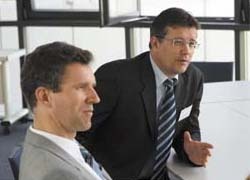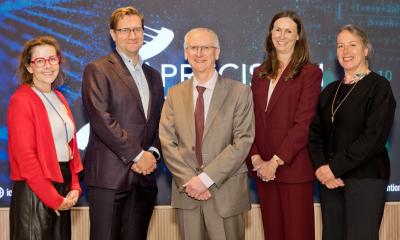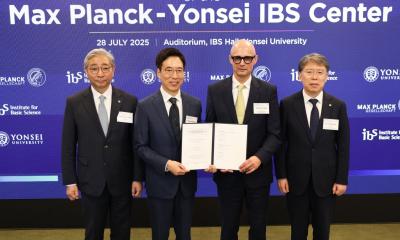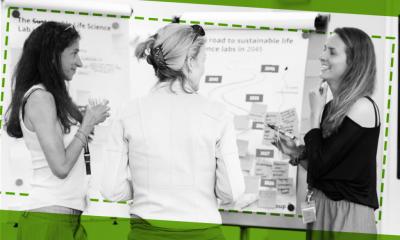An all-out attack on auto-immune disease
The foundation of the AESKU.KIPP Institute, based in Wendelsheim, Germany, presents a platform to initiate and co-ordinate international auto-immunity research projects.

Although auto-immune diseases are the third most common cause of death after cardiovascular diseases and cancer, there has been a lack of focused, results-oriented fundamental research and collation of interdisciplinary knowledge at an international level. However, the foundation of the AESKU.KIPP Institute, based in Wendelsheim, Germany, presents a platform to initiate and co-ordinate international auto-immunity research projects. As the main initiator of this organisation, and Chairman of the Board of the interdisciplinary auto-immunity research association AIRA e.V, Dr Torsten Matthias describes the Institute’s foundation and objectives.
AESKU Diagnostics, founded in 2000, now offers, the largest product range of innovative test systems for auto-immune diagnostics, worldwide, Dr Torsten Matthias explained. The development of innovative and market-driven products for auto-immune diagnostics was, and still is our clear objective. At the same time we are involved in the development of new therapy procedures and in fundamental research, because we are convinced that you can only really develop effective methods for diagnosis, prognosis and therapies if you understand all aspects of a disease and actively use the synergies between different medical disciplines. We wanted to set up an independent research institute, on an international level, to promote further developments in this area.’
Will the Institute’s research be oriented around the requirements of healthcare organisations for diagnoses and therapy procedures?
‘Definitely not. The institute will work independently, with the objective of continuously, interdisciplinary and internationally collating and developing the basic findings on auto-immunity. Auto-immune diseases are very complex. The previous diversification of research in the field of auto-immunity presents a significant problem for research. Some researchers specialise in T-cells, others carry out research on B-cells, whilst other researchers focus on certain organs, such as the liver. We want to bring these researchers – doctors, biologists and biochemists – together, because each is such an expert within his/her own field that they sometimes find it difficult to look beyond their own specialist fields.
‘The Institute will streamline this research and information, and our findings will offer new impulses for diagnoses and therapies, as well as comprehensive data. This will happen through international research co-operation and developmental projects, for which we can offer the necessary premises and staff. The main focus of our activities will be research into the causes of auto-immune diseases. Building on this, we then aim to develop new therapy concepts and test systems for the early diagnosis and prognosis of auto-immune diseases through clinical research co-operation.
‘A further focus is intensive knowledge management and advanced training for doctors, in the form of seminars or PhD degree courses. There will also be information events for patients, to promote the general awareness around auto-immune diseases.’
You mentioned the complexity of auto-immune diseases. What is the clinical pattern?
‘A healthy body has a defence mechanism against viruses and bacteria, the immune system. If this is intact, such intruders are recognised by antibodies and destroyed. With auto-immune diseases the organism of those affected are reprogrammed: The antibodies lose their ability to distinguish between our own and foreign tissue, so they begin to attack the body’s own tissue or organs. Some auto-immune diseases are directed against certain organs such as the thyroid. The more severe auto-immune diseases are systemic, such as Lupus Erythematodes. With this type of the disease it is not just certain organs that can be affected but also blood vessels and the brain. Further typical auto-immune diseases are diabetes mellitus type 1, rheumatic arthritis or multiple sclerosis. It is still not known why this reprogramming of the immune system occurs and it is one of the clearly defined objectives of our research institution to discover this.’
How do you finance such a project?
‘The Institute is financed as a public-private partnership. Apart from my involvement on the financial side, we also have the support of our Swiss private investor Dr Karl-Heinz Kipp, which has secured the future of the institute for the first few years. The motivation for both of us is not just our belief in the need for such an institute but also our belief in the success of this project.
‘The Rhineland-Palatinate’s Ministry of Economics is also subsidising equipment purchases for the laboratory at the Institute, depending on its current needs at any given time. In the medium and long term, public funds, donations and co-operation with various private companies will also go towards financing the Institute. Finally, and as soon as possible, we hope to put the results of our research into practice by developing new products that can be licensed for the public good.
‘Through Dr Kipp’s support, as a first step towards developing the Institute, we have been able to set up the first professorship for auto-immunity, at Tel Aviv University. This chair has been awarded to Professor Yehuda Schoenfeld, who has made a name in the field of auto-immunity through numerous publications and worldwide guest professorships. We are also glad to have Professor Schoenfeld on our scientific advisory board. The board is made up of ten of the world’s best researchers and therefore represents an international network of competency.’
A current trend is to draw together laboratory, bioscientific research and imaging fields. Might companies, such as Siemens, which is expanding its position in the growth area of molecular diagnostics, show interest in the Institute?
‘Siemens would definitely be an interesting partner, because it is trend-setting. The company has purchased the Diagnostic Products Corporation, in Los Angeles, as well as Bayer Diagnostics, which has focused a lot of competence. In return, our organisation can work very promptly, and our research can concentrate on assumed niches. Assumed because many of these “niches” have actually already become the focus of attention - such as rheumatoid arthritis, which affects one percent of the entire world population. Within these niches we research the parameters that are decisive for diagnosis.
‘There are still no reliable test systems for the diagnosis and prognosis of many auto-immune diseases. We see it as our responsibility to develop these, so that in the future we can achieve an early and clear diagnosis, because the earlier a disease is diagnosed the earlier it can be treated. This sounds logical, but up until a few years ago wasn’t always acknowledged as a matter of course.
‘We hope to continuously improve diagnosis and therapy standards with innovative products and to promote awareness and understanding of the medical and economic importance of auto-immune diseases through the AESKU.KIPP Institute
Interview: Daniela Zimmermann
30.08.2006





